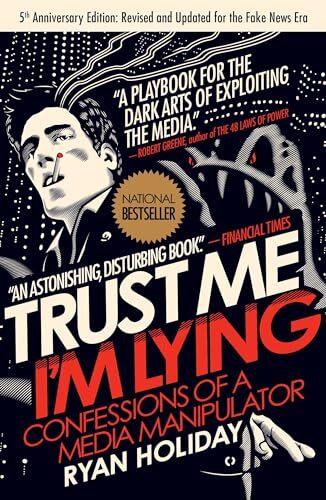
This book is scathing critique of blogs, news, fake news, the media, and how easily they can be—and are—manipulated. This might sound like a niche topic better left to marketers, but I can’t think of a more important topic in today’s world. Once you’ve read this book, you will not be able to watch the news or browse the Internet the same way again. And even more disturbingly, you’ll have a slightly better understanding of just how someone like Donald Trump could’ve been elected president.
This isn’t a story of tin-foil hat wearing conspiracy nuts. It’s a story of what happens when all the information we see online—from blogs, online publications, and social media—is driven by ads. To quote Holiday:
In the pay-per-pageview model, every post is a conflict of interest.
I have to admit I’ve never sat back and fully thought through the business model behind popular publications such as the Huffington Post, Mashable, LifeHacker, Gawker, TechCrunch, Politico:
- How they pay writers.
- What deadlines they impose.
- What fact checking standards they require (or don’t require).
- Why this industry developed something as absurd and destructive as iterative journalism.
- How they are on an endless search for exaggeration, sensationalism, and clicks.
Perhaps, most importantly, I’ve never thought about what news is. Again, quoting the book:
Only the unexpected makes the news.
The unexpected. Not the important. Not the things you need to know. Not what actually matters, but simply, what is surprising and novel.
The result of all of this is that a remarkable percentage of what we read is false, harmful, and misleading. This has finally bubbled up to public awareness, at least a little bit, with all the fake news scandals around the 2016 election. We’re going to be feeling the damage from this not just for the next 4 years, but for the next 40.
In short, if you spend any time at all online, you need to read this book. Just as you shouldn’t jump in the ocean without learning to swim, you shouldn’t jump on the Internet without learning about media manipulation.
Quotes
As always, I’ve saved a few of my favorite quotes from the book:
We’re a country governed by public opinion, and public opinion is largely governed by the press, so isn’t it critical to understand what governs the press?
The media, like any group of animals, gallops in a herd. It takes just one steer to start a stampede.
Media was once about protecting a name; on the web it is about building one.
In the pay-per-pageview model, every post is a conflict of interest.
The most powerful predictor of what spreads online is anger.
Let’s start a basic principle: Only the unexpected makes the news.
The reality is that while the Internet allows content to be written iteratively, the audience does not read or consume it iteratively. Each member usually sees what he or she sees a single time—a snapshot of the process—and makes his or her conclusions from that.
You cannot have your news instantly and have it done well. You cannot have your news reduced to 140 characters or less without losing large parts of it. You cannot manipulate the news but not expect it to be manipulated against you. You cannot have your news for free; you can only obscure the costs.
